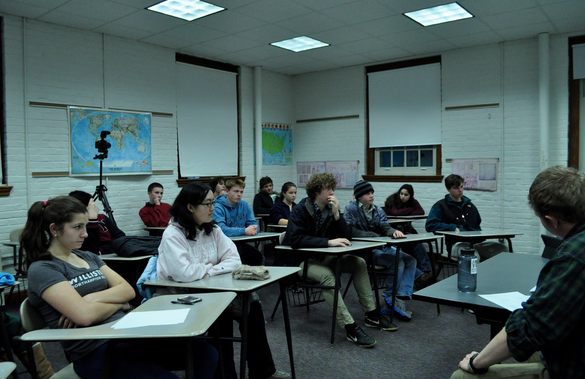PAC: Fracking Debate

The fracking debate on Friday, January 24th was well attended and participation was plentiful.
On Friday January 24th, the Political Awareness Club met for a well-attended debate on fracking. Lyra Sior and Nick Pattison argued against the practice, while Adam Krol and Eric Ostberg argued for it.
The debate began with a short audio clip from National Geographic describing the process of fracking.
Christian Knapp, PAC president, described the overall process in short: “Fracking is a term used to describe the process of pumping water, sand, and chemicals into the ground to break shale rock in order to release oil and natural gas.” The audio clip explained, “The long-term environmental effects of fracking are unknown,” foreshadowing the controversial nature of the topic.
Knapp then lead the two debate teams into their opening statements.
Determined by a coin flip, Eric Ostberg and Adam Krol began. Ostberg opened the debate by acknowledging that fracking “is not a perfect process,” but that its benefits outweigh its drawbacks. The team mentioned that fracking could enable the United States to supply its own energy and relieve the country of foreign dependence in that area. Ostberg urged that we “hop on board” with fracking in order to “revive the country.”
Lyria Sior and Nick Pattison then began their opening statement. Pattison stated that while fracking would lower costs and create jobs in the United States, there are “environmental issues and unknown dangers that come with the process.”
Knapp concluded opening statements and opened up questioning from the audience.
Gabe Hohmann asked the pro-fracking team what they thought of the reports of faucets in Pennsylvania being set on fire, purportedly as a result of waste fluid from fracking. Ostberg and Krol argued that coal mining and other processes that have been used for a long time in Pennsylvania could also cause this, claiming fracking was not to blame. They noted that such reports were “sporadic and rare,” and that the reports with sufficient grounds were a result of poor well construction, a mistake that they claim “is easily regulated.”
The anti-fracking team gave a rebuttal, pointing out that fracking fluid contains “tons of chemicals” that can be “hazardous” and create “health concerns.” Pattison also mentioned that fracking negatively affects agriculture but contaminating the water supply.
The next question was directed to the anti-fracking team, regarding which chemicals were being used in fracking fluid. Pattison and Sior responded by saying “there are 652 chemicals, 29 of which are human carcinogens and include lead, uranium, and other chemicals.”
The pro-fracking team responded by explaining: “90% of fracking fluid is water, 9.5% is sand, which leaves just .5% for other chemicals”. They added: “many normal household products go into the .5%”
Further questions included whether fracking regulations should be handled at the state or the federal level, why spending effort of fracking was worth it, and if the anti-fracking team had a compromise to aid the economy if fracking was banned.
Brief closing statements followed, and Knapp closed the debate.
In the next PAC debate, Christian Knapp will be sharing his plan to eliminate inequality in the public school system.







